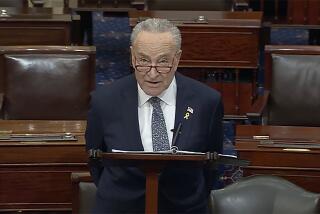U.S. Senators Urge Embassy in Jerusalem : Mideast: Lawmakers’ letter to Clinton pushes for relocation from Tel Aviv as show of support for Israel. President fears disruption of peace process.
- Share via
WASHINGTON — With more than half of the membership of the Senate already signed on, Congress is about to demand that the Clinton Administration move the U.S. Embassy in Israel from Tel Aviv to Jerusalem, a step that combines an almost irresistible political attraction with a potential diplomatic disaster.
A letter drafted by Sens. Alfonse M. D’Amato (R-N.Y.) and Daniel Patrick Moynihan (D-N.Y.) and signed by 57 other senators of both parties urges Secretary of State Warren Christopher to make the move as proof of Washington’s support for “united Jerusalem as the capital of the State of Israel.”
Christopher said he is reluctant to order the switch, because it could disrupt the delicate Middle East peace process by angering the Arab parties and casting a shadow over the U.S. role as unbiased mediator.
But even he acknowledged the measure’s political luster.
“The President has indicated a good deal of sympathy toward the position taken by that letter, but he’s also said he thinks we should do nothing to interfere with or disrupt the process by which the parties might reach their own conclusion,” Christopher told the House International Relations Committee recently.
Jerusalem is one of the most emotional issues in the conflict between Israel and its Arab neighbors.
Dating back to biblical times, the city has been a prize of war, conquered by, among others, King David’s Israelites, Romans, Muslims, crusaders and modern Israelis. In several thousands of years of history, Jerusalem has accumulated some of the most holy sites of three major religions--Judaism, Christianity and Islam.
Both Israelis and Palestinians claim Jerusalem as their capital. That political dispute is troublesome, although possibly soluble.
But the future of Jerusalem is also a religious issue, an inflammatory dispute between Jews and Muslims, with Christians divided about which side to support.
For years, Jerusalem was believed to be the deal-breaker of Middle East negotiations. The issue can never be settled, the argument went, so Israel and the Palestinians can never make peace.
But the Israelis and Palestinians confounded this conventional wisdom in 1993 by agreeing to start making peace while deferring a decision on Jerusalem until later in the process. It may still prove to be the issue that derails the talks, but, by deferring it, the Israelis and the Palestinians may get a better look at the effects of peace before having to decide whether arguing over Jerusalem is worth wrecking the process.
Administration officials, and some non-government experts, say it would be a serious mistake for Washington to do anything to disrupt the careful balance of the negotiations.
Even Haim Ramon, leader of Israel’s giant Histadrut labor federation and a former Cabinet minister, said in a recent visit to the United States: “I don’t think it’s very clever to touch now the issue of Jerusalem.”
But in the U.S. political system, nuances can easily be obliterated.
For the vast majority of Americans, Jew and Gentile, Israel’s desire to have foreign embassies located in the country’s capital seems like a matter of simple justice. Politically potent Jewish organizations have been demanding relocation of the U.S. Embassy for decades.
*
On Capitol Hill, the issue is a hearty perennial. More than a decade ago, 50 senators and 227 House members urged the Ronald Reagan Administration to make the move. Though Reagan supported the step before being elected, his Administration refused to take it.
Although the plan already commands a majority in the Senate--and probably will soon line up at least half of the membership of the House, where it is already supported by Speaker Newt Gingrich (R-Ga.)--backers emphasize that they are only requesting Administration action at this point. They have not introduced legislation to force a change.
But Malcolm Hoenlein, vice chairman of the Conference of Presidents of Major American Jewish Organizations, predicted that Congress will force the move if the Administration balks.
“I think the mood in Congress to demand it is very strong,” he said in a telephone interview.
He said President Clinton has already “gone farther than other Presidents” in expressing support for Israel’s claim to all of Jerusalem, even if the Administration is reluctant to deal with the explosive embassy issue.
The D’Amato-Moynihan letter seeks to cushion the effect on Arab-Israeli negotiations by urging the Administration to make the move in May, 1999.
That’s the target date for completion of the Israeli-Palestinian “final status” negotiations. But the talks are lagging, and no one expects them to be completed on time.
*
Although officials of major U.S. Jewish groups are unanimous in demanding that the United States re-establish its embassy in Jerusalem, many do not want to be accused of damaging the peace talks. So the 1999 effective date was picked as a compromise.
“This buys us some time and gives us some room,” one Jewish leader said. “We want to see how the Administration responds.”
But Administration officials said that, if the United States agrees to move the embassy, even at a later date, the decision would be considered by all Arab parties to be a betrayal of Washington’s status as impartial mediator.
More to Read
Sign up for Essential California
The most important California stories and recommendations in your inbox every morning.
You may occasionally receive promotional content from the Los Angeles Times.













